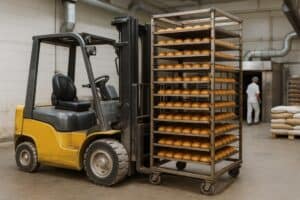When you think about baking, you don’t usually think of heavy machinery…You probably picture flour-dusted aprons and warm ovens when you think about baking operations. But behind every loaf of bread and every batch of cookies lies a complex material handling operation that relies heavily on specialized forklifts. The baking industry moves millions of pounds of ingredients, finished products, and packaging materials every single day, and it takes some serious engineering to make that happen safely and efficiently.

Your Typical Forklift Won’t Cut It in a Bakery
Standard warehouse forklifts face unique challenges in baking environments that would make even the toughest equipment operators sweat. The combination of temperature extremes, moisture, flour dust, and strict food safety requirements means you need forklifts that are specifically designed for the job.
Temperature is your biggest enemy here. One minute you’re moving pallets in a freezer at -10°F, the next you’re near ovens running at 450°F. That kind of thermal shock can destroy hydraulic seals, crack metal components, and turn your reliable forklift into an expensive paperweight.
Special Features That Make the Difference
Connell Material Handling has forklifts that are food-grade and come packed with features you won’t find on your average warehouse model. The hydraulic fluid is food-grade approved, so if there’s ever a leak near your products, you won’t have to throw away an entire production run. The paint and coatings are specially formulated to resist the constant washing and sanitizing that food facilities require.
You’ll also notice smooth, crevice-free surfaces that don’t trap flour or dough particles. Every weld is ground smooth, every bolt head is countersunk, and drainage holes are strategically placed to prevent water and debris buildup. These aren’t just nice touches – they’re requirements for passing health inspections.
Built to Handle What Baking Throws at Them
The weight capacity needs are intense in commercial baking. You’re not just moving individual bags of flour; you’re handling:
-
Pallets of sugar weighing up to 2,000 pounds
-
Industrial mixing bowls filled with dough
-
Loaded sheet pans on tall rolling racks
-
Bulk ingredient containers that can exceed 3,000 pounds
The mast design has to accommodate the high stacking requirements of modern bakeries, too. You need to reach 20 feet or higher to maximize your vertical storage space, all while maintaining stability with loads that shift and settle during transport.
Keeping Things Clean in a Dirty Job
You might think baking is a clean business, but flour gets everywhere. It coats every surface, works its way into every gap, and creates an environment that’s surprisingly hard on equipment. Food-grade forklifts use sealed electrical components and positive air pressure systems to keep contaminants out of critical areas.
The cleaning process itself is brutal on standard forklifts. High-pressure washing, caustic cleaning chemicals, and daily sanitizing cycles would quickly destroy equipment that wasn’t specifically designed for it. That’s why bakery forklifts use stainless steel components wherever possible and special protective coatings on everything else.
Why the Investment Pays Off
When you invest in the right forklift for your baking operation, you’re not just buying equipment – you’re buying peace of mind. Food safety compliance becomes easier, downtime decreases dramatically, and your operators can focus on moving product instead of working around equipment limitations.
The bottom line is simple: in an industry where contamination can shut you down and efficiency determines profitability, having forklifts that are truly built for the job isn’t optional. It’s essential.
